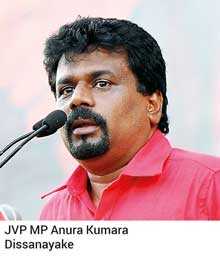Tuesday Feb 17, 2026
Tuesday Feb 17, 2026
Thursday, 11 July 2019 01:09 - - {{hitsCtrl.values.hits}}
By Ashwin Hemmathagama – Our Lobby Correspondent
Challenging the Unity Government and its right to govern the country by failing to prevent the Easter Sunday attacks, the Janatha Vimukthi Peramuna (JVP) moved a No-Confidence Motion yesterday in Parliament.
The Motion charged the Government for the fact that proper information regarding the suicide terrorist attacks that occurred in Colombo, Negombo, and Batticaloa areas on Easter Sunday had been made available to the Prime Minister, the Cabinet, and the Government, whose subsequent lack of action amounts to criminal negligence or omission by the commission or omission of acts as specified, as a result of which over 250 persons, including Sri Lankan citizens, have been killed, nearly 500 more wounded, and properties damaged. 
Moving the Motion, JVP MP Anura Kumara Dissanayake found the Prime Minister, the Cabinet, and the Government responsible for failure to take any action, despite the knowledge that certain sections of Sri Lankans had maintained various relationships with the international Islamic extremist organisation ISIS, and had been engaged in various activities since 2014, as has been stated by the Prime Minister on 8 May in Parliament.
“They failed to take action, although the Muslim community itself had informed the Government and relevant institutions responsible that various Islamic religious extremist organisations are functioning within the Muslim society. Also failed to apprehend or properly enforce the law against Zahran Hashim, who killed himself by exploding a bomb on 21 April, in relation to threats and attacks unleashed on the people living in the Kattankudy area at various instances, and A. L. M. Niyaz, who killed himself by exploding a bomb in Sainthamaruthu on 26 April, despite warrants being issued against them by the Court, while the perpetrators were engaging in various activities in the Kattankudy area in public,” he charged.
According to the Motion, the Sri Lanka Muslim Council informed the National Intelligence wing on 28 December 2018 that a group led by Zahran Hashim was involved in damaging Buddha statues in Mawanella on 24 December 2018. Based on this complaint, despite a few people having been taken into custody on suspicion of this attack, a Minister of the Government himself has stated that there were interventions obstructing the continuation of those investigations.
“The Government has failed to take legal and security measures in relation to various activities of Islamic extremist organisations well before these attacks took place, and particularly about the involvement of a significant number of Sri Lankans with the ISIS organisation, and doing various activities with it. The Prime Minister has neglected the fundamental responsibilities he is expected to fulfil to the people of the country, by the Prime Minister, who is a member of the Security Council, not participating at the sessions of the Security Council. Notwithstanding specific information provided by foreign intelligence services that suicide bomb attacks would be carried out in Sri Lanka, including names of the persons involved, their telephone numbers, and National Identity Card numbers, targeting Catholic churches and hotels, neglecting to act upon such information, the Government failed to prevent this devastation,” he charged.
According to MP Dissanayake, moreover, the Government neglected to act, despite specific warnings made again by foreign intelligence services prior to such attacks on 21 April. He also cited Director/Ministerial Security Division, Director/Judicial Security Division, Director/Former Presidents’ Security Division, Acting Director/Diplomatic Security Division, and Acting Director/Former Presidents’ Security Division, receiving prior information through letter No. DIG/SPR/126/4.19 titled ‘Information of an alleged plan attack’ dated 11 April by Deputy Inspector General of Police Priyalal Dassanayake in charge of Special Protection Range, stating that planned suicide attacks would be launched targeting specific locations.
“The Prime Minister and the Ministers have acted in such a way to create confusion and insecurity in relation to ordinary public life and public security, subsequent to the series of attacks carried out on 21 April, by not accepting the responsibility for the said series of attacks, but trying to put the blame on other parties, with the Ministers of the Government making irresponsible, contradictory, and false statements. Certain Ministers of the Government have acted to obstruct the investigation process regarding the suspects arrested in relation to the Easter Sunday attack, and to obstruct or prevent law enforcement in relation to the said crimes,” he said.
MP Dissanayake also held the Government responsible for omitting to fulfil its duties and obligations to the people, by failing to act with due vigilance and responsibility, and by failing to follow the proper procedure to suppress such incidents to prevent the extremist violent actions, such as homicides, damages to property, and conflicts among people, which occurred in Gampaha and the North Western Province on 13 May, despite the possession of a comprehensive set of laws to suppress the recurrence of a similar series of attacks or perpetration of crimes of any other form, subsequent to the series of terrorist attacks that took place.
“As a result of the Easter Sunday attacks, the Government has failed to restore the normal economic processes of the country, even after the lapse of a period of one month since the Easter Sunday attack, and it has failed to bring the school and university systems in the country back to normalcy, and it has failed to restore the functioning of public and private sectors, and it has neglected its duties and responsibilities as a Government towards the citizens of this country; and it has acted creating room for foreign countries to interfere in internal affairs of the country, on the grounds of the anarchic situation that has been created in the country consequent to its failure to prevent the serial attacks on 21 April, and due to its failure to restore the security situation and the civil life of the country back to normalcy,” he added.